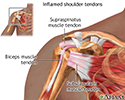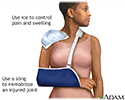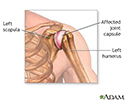Shoulder pain
Pain - shoulderShoulder pain is any pain in or around the shoulder joint.
The Basics
Tests for Shoulder pain
Shoulder pain - Animation
Shoulder pain
Animation
Abdominal pain - Animation
Abdominal pain
Animation
Inflamed shoulder tendons
Tearing and inflammation of the tendons of the shoulder muscles can occur in sports which require the arm to be moved over the head repeatedly as in tennis, pitching, swimming, and lifting weights. Most often the shoulder will heal if a break is taken from the activities that caused the problem and pain. Intermittent ice packs applied to the shoulder and non-steroidal anti-inflammatory drugs can also help reduce inflammation and pain.
Inflamed shoulder tendons
illustration
Shoulder sling
After a shoulder injury you may be fitted with a shoulder sling to help immobilize the joint to aid in the healing process. Your provider may advise you to apply ice to help ease pain and swelling.
Shoulder sling
illustration
Shoulder joint inflammation
An inflammation of the shoulder joint can cause pain and restricted joint movement.
Shoulder joint inflammation
illustration
Inflamed shoulder tendons
Tearing and inflammation of the tendons of the shoulder muscles can occur in sports which require the arm to be moved over the head repeatedly as in tennis, pitching, swimming, and lifting weights. Most often the shoulder will heal if a break is taken from the activities that caused the problem and pain. Intermittent ice packs applied to the shoulder and non-steroidal anti-inflammatory drugs can also help reduce inflammation and pain.
Inflamed shoulder tendons
illustration
Shoulder sling
After a shoulder injury you may be fitted with a shoulder sling to help immobilize the joint to aid in the healing process. Your provider may advise you to apply ice to help ease pain and swelling.
Shoulder sling
illustration
Shoulder joint inflammation
An inflammation of the shoulder joint can cause pain and restricted joint movement.
Shoulder joint inflammation
illustration
Shoulder pain
Pain - shoulderShoulder pain is any pain in or around the shoulder joint.
The Basics
Tests for Shoulder pain
Shoulder pain
Pain - shoulderShoulder pain is any pain in or around the shoulder joint.
The Basics
Tests for Shoulder pain
Review Date: 8/12/2023
Reviewed By: C. Benjamin Ma, MD, Professor, Chief, Sports Medicine and Shoulder Service, UCSF Department of Orthopaedic Surgery, San Francisco, CA. Also reviewed by David C. Dugdale, MD, Medical Director, Brenda Conaway, Editorial Director, and the A.D.A.M. Editorial team.





